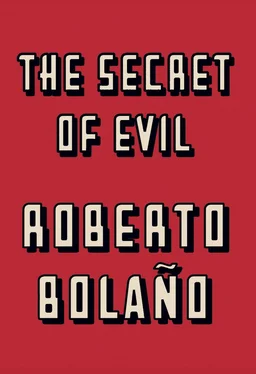So let me make it perfectly clear that I didn’t want the girl for self-promotion. I have nothing against publicity as such, but there’s a line between vulgar and sophisticated publicity. And that line should never be crossed, or so I was taught as a child, because there’s no going back.
The next day I got a call from the NGO. They said they’d done everything humanly possible, but it wasn’t going to be Olga. Instead they talked to me about Mariam, or María, a twelve-year-old Saharan girl who had lost her father in the war, a lovely girl, they said, and very clever for her age. Olga was twelve as well, I thought, and then I remembered her birthday and realized that I hadn’t even sent her a card, and before I knew it I was crying, while the guy from the NGO went on giving me information about Mariam; she’d seen all sorts of atrocities, he said, and yet had somehow preserved her innocence. What do you mean? I asked. That’s she’s still a girl, in spite of everything she’s been through. But she’s twelve, I said. You haven’t seen what I’ve seen, Lucía, he said in a velvety voice. The guy was trying to hit on me! He started telling me stories, not about the children, but about things that had happened to him. You have to travel a lot in this job. I travel a lot too, I said. I know, he said. For a while we talked about our respective travels. Then I agreed to foster Mariam and we said good-bye and hung up.
The only people I told were my parents and my sister. I didn’t say anything to Gorka. Partly because he wasn’t in Madrid (he’d gone to Mallorca for a sailing regatta), partly because I’m an independent woman and it was my decision and mine alone. Naturally, Gorka had plans for the summer, vague plans to go to an island in the Caribbean, and then to find a place in Mallorca, near his sailing friends, where we could stay till the beginning of September. I adore the sea. And I enjoy the regattas. I’m actually a better sailor than Gorka, who took it up quite recently (I’ve been sailing since I was a child), but like the rest of us, he’s entitled to waste his time however he sees fit.
Belano, our dear Arturo Belano, returns to Mexico City. More than twenty years have passed since the last time he was there. The plane is flying over the city, and he wakes with a start. The uneasiness he has felt throughout the trip intensifies. At the airport in Mexico City he has to catch a connecting flight to Guadalajara, for the Book Fair, to which he’s been invited. Belano is now a fairly well-known author and is often invited to international events, although he doesn’t travel much. This is his first trip to Mexico in more than twenty years. Last year he had two invitations and he pulled out at the last minute. The year before last he had four and he pulled out at the last minute. I can’t remember how many invitations he had three years ago, but he pulled out at the last minute. Still, here he is in Mexico, in the Mexico City airport, following a group of perfect strangers who are heading toward the transit zone to catch the plane to Guadalajara. The corridor leads through a labyrinth of glass. Belano is the last in line. His steps are increasingly slow and hesitant. In a waiting room he spots a young Argentine writer who is also going to Guadalajara. Belano immediately takes cover behind a pillar. The Argentine is reading the paper, whose cultural supplement — maybe that’s what he’s reading — is entirely devoted to the Book Fair. After a few moments, he looks up and glances around, as if he knew he was being observed, but he doesn’t see Belano, and his gaze returns to the paper. After a while a very beautiful woman approaches the Argentine and kisses him from behind. Belano knows her. She’s a Mexican, born in Guadalajara. The Argentine man and the Mexican woman both live in Barcelona, together, and Belano is a friend of theirs. The Mexican woman and the Argentine man exchange a few words. Somehow both of them have sensed that they are being watched. Belano tries to read their lips, but he can’t work out what they’re saying. He doesn’t leave his hiding place until their backs are turned. By the time he can finally escape from that corridor, the line of passengers heading for the connecting flight to Guadalajara has disappeared, and Belano realizes, with a deepening sense of relief, that he has no desire to go to Guadalajara and take part in the Book Fair; what he wants to do is to stay in Mexico City. And that is what he does. He heads for the exit. His passport is examined, and soon he’s outside, looking for a taxi.
Back in Mexico, he thinks.
The taxi driver looks at him as if he were an old acquaintance. Belano has heard stories about the taxi drivers of Mexico City and muggings in the vicinity of the airport. But all those stories vanish now. Where are we going, young man? asks the driver, who is younger than Belano. Belano gives him the most recent address that he has for Ulises Lima. OK, says the driver, and the taxi pulls away and plunges into the city. Belano shuts his eyes, the way he used to when he lived there, but now he’s so tired that he opens them almost immediately, and his old city, the city of his adolescence, displays itself to him for free. Nothing has changed, he thinks, although he knows that everything has changed.
It’s a cemetery morning. The sky’s a dirty yellow. The clouds, moving slowly from south to north, look like graveyards adrift; sometimes they part to reveal scraps of gray sky, sometimes they come together with a dry, earthy grinding that no one, not even Belano, can hear, but it gives him a headache, the way it did when he was an adolescent and lived in Colonia Lindavista or Colonia Guadalupe-Tepeyac.
The people walking on the sidewalks, however, are the same; they’re younger, they probably hadn’t even been born when he left, but basically these are the faces he saw in 1968, in 1974, in 1976. The taxi driver tries to engage him in conversation, but Belano doesn’t feel like talking. When he can finally close his eyes again, he sees his taxi driving at full speed down a busy avenue, while robbers hold up other taxis and the passengers die with terrified expressions on their faces. Vaguely familiar gestures and words. Fear. Then he sees nothing and falls asleep the way a stone falls down a well.
Here we are, says the taxi driver.
Belano looks out of the window. They’re in the street where Ulises Lima used to live. He pays and gets out. Is this your first time in Mexico? asks the driver. No, I used to live here. Are you Mexican? the driver asks as he gives him the change. More or less, says Belano.
Then he’s standing alone on the sidewalk, looking at the façade of the building.
Belano’s hair is short. A bald patch like a tonsure reveals the top of his scalp. He’s no longer the long-haired youth who once roamed these streets. Now he’s wearing a black leather jacket and gray trousers and a white shirt and a pair of Martinelli shoes. He’s been invited to Mexico to participate in a conference that will gather a group of Latin American writers. At least two of his friends have also been invited. His books are read (a bit) in Spain and Latin America, and all of them have been translated into various languages. What am I doing here? he wonders.
He walks toward the entrance of the building. He takes out his address book. He presses the buzzer of the apartment where Ulises Lima used to live. Three long buzzes. No one answers. He buzzes another apartment. A woman’s voice asks who it is. I’m a friend of Ulises Lima, says Belano. She hangs up abruptly. He buzzes another apartment. A man’s voice shouts, Who is it? A friend of Ulises Lima, says Belano, feeling more and more ridiculous. The door opens with an electric click, and Belano starts climbing the stairs to the third floor. By the time he reaches the landing, the effort is making him sweat. There are three doors and a long, dimly lit corridor. This is where Ulises Lima spent the last days of his life, he thinks, but when he rings the doorbell he finds himself irrationally hoping to hear his friend’s approaching steps and then to see his smiling face appear at the crack in the door.
Читать дальше












